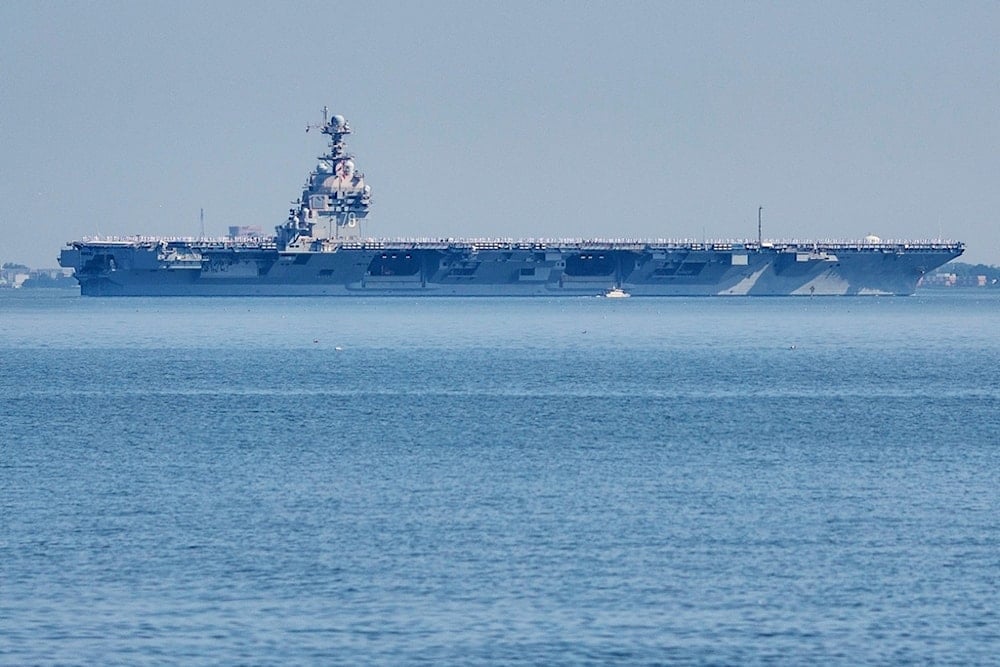Leaked contracts reveal long-term US buildup near Venezuela
New Pentagon procurement records reveal that the US is preparing to sustain a major military buildup in the Caribbean until at least 2028, raising concerns that Washington is laying the groundwork for a long-term confrontation with Venezuela.
-

FILE The USS Gerald R. Ford aircraft carrier leaves Naval Station Norfolk, June 23, 2025, in Norfolk, Va (AP Photo/John Clark, File)
New contracting records reviewed by The Intercept indicate that Washington is laying the groundwork for an extended military deployment across the Caribbean, pointing to a mission likely to stretch through the end of President Donald Trump's term. The files offer an unusual window into Pentagon planning at a moment when speculation in Washington about a potential clash with Venezuela is intensifying.
Massive Food Orders Signal Multi-Year Operations
The documents, issued through the Defense Logistics Agency, detail enormous quantities of food ordered for US forces stationed in Puerto Rico and surrounding waters. Every major military branch appears in the procurement list, from the Navy and Air Force to the Coast Guard and Marines. One spreadsheet for “Puerto Rico Troops” schedules deliveries of tens of thousands of pounds of baked goods between November 15 of this year and November 11, 2028, including items such as individually wrapped pastries, rolls, and tortillas.
Mark Cancian, a senior adviser at the Center for Strategic and International Studies who previously worked on defense procurement at the Office of Management and Budget, said the length and scale of the order are telling. “The procurement’s length of time and the level of effort seemed to point to these operations continuing at the current level for several years,” he told The Intercept. He added that the size of the Navy presence implied by the documents is “far larger than what it has been in recent years” and suggests continued involvement in counter-drug missions.
Largest Caribbean Naval Concentration Since the Cold War
The Pentagon has deployed around 15,000 personnel to the region since the summer, a level of military power not seen in the Caribbean since the Cold War. That force includes the USS Gerald R. Ford, the Navy’s most advanced aircraft carrier, accompanied by more than 75 aircraft. The operation has already seen more than 20 lethal strikes on vessels the US characterizes as drug-smuggling craft, attacks that have left over 80 civilians dead.
Alongside those actions, the Trump administration has quietly designated its campaign against 24 cartels, gangs, and armed groups, including “Cártel de los Soles,” which US officials claim is “headed by Nicolas Maduro and other high-ranking Venezuelan individuals,” as a “non-international armed conflict.” Maduro denies such a cartel exists. Current and former officials quoted by The Intercept say these steps fit into a longer strategy aimed at pressuring or removing the Venezuelan government.
Southern Command has largely declined to discuss the buildup. A spokesperson said: “For operational security reasons, we do not release itemized operational details of asset, unit, and troop movements and locations,” adding that only officially cleared information will be published.
Procurement Expands 450% in Weeks
Other documents reviewed by The Intercept show the food orders expanding dramatically: a 40 percent increase in cost estimates and a 450 percent surge in the total weight of supplies, alongside a jump from three to 16 delivery sites in Puerto Rico. Locations listed include Muñiz Air National Guard Base, Fort Buchanan, and the long-inactive Roosevelt Roads naval base, now hosting thousands of Marines.
Some materials reference “USS Hiroshima,” a fictional vessel, though the associated Defense Activity Address Code aligns with the 22nd Marine Expeditionary Unit. Members of the 22nd MEU have been conducting training in Trinidad and Tobago and at Camp Santiago in Puerto Rico. Maduro denounced the exercises, calling them “irresponsible” and warning that Trinidad and Tobago was “allowing their waters and land to be used to gravely threaten the peace of the Caribbean.”
Analysts Warn of Possible Escalation
One former defense official, speaking anonymously due to his work with a military contractor, said the disclosures raise questions the Pentagon has avoided addressing. “People will ask whether this means escalation from the strikes on smugglers into a Venezuelan campaign, whatever that eventually looks like,” he said.
Additional DLA documents outline forthcoming catering services for Marines and Navy ships into 2025 and propose further six-month feeding contracts for visiting vessels, covering everything from steak and lasagna to brownie mix and breakfast burritos.
Operation Southern Spear and the Venezuela Question
Defense Secretary Pete Hegseth recently labeled the ongoing offensive “Operation Southern Spear,” writing that the mission “defends our Homeland, removes narco-terrorists from our Hemisphere, and secures our Homeland from the drugs that are killing our people.”
Trump, meanwhile, has said he is open to talks with Maduro but has not ruled out using force. Asked whether the US plans to go to war with Venezuela, the president responded: “I doubt it. I don’t think so.” When pressed on whether Maduro’s presidency was coming to an end, he answered: “I would say yeah. I think so.”
Potential for Further Tension
According to policy analyst Gabe Murphy of Taxpayers for Common Sense, the newly uncovered procurement trail sheds light on the administration’s real intentions. “These documents suggest that the Trump administration plans to maintain a significantly increased military presence in the Caribbean through the remainder of President Trump’s term in office. With ongoing military strikes against alleged drug traffickers in the Caribbean and the Pacific, the potential for escalation between the US and Venezuela in particular is high, even if the administration isn’t seeking it,” he told The Intercept.
Read more: Caribbean basin in US crosshairs: The Trump doctrine at work

 5 Min Read
5 Min Read








